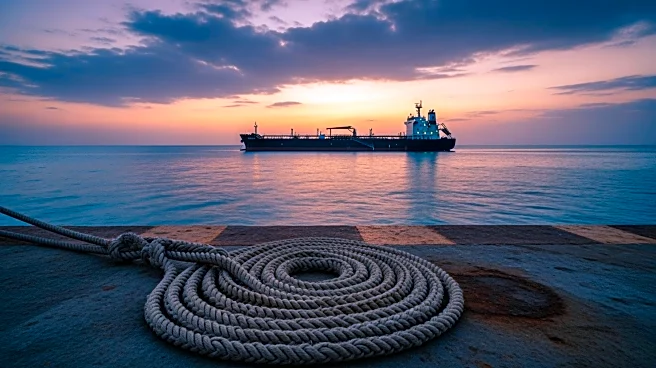What's Happening?
Iran has seized the Marshall Islands-flagged oil tanker Talara in the Gulf of Oman, marking the first such incident in over a year. The tanker was captured by the Islamic Revolutionary Guard Corps' naval
forces approximately 20 nautical miles off the UAE's coastline. The vessel, managed by Cyprus-based Columbia Shipmanagement, lost contact while transiting near the UAE. The seizure involved three boats with a raiding party boarding the Talara. The U.S. Navy monitored the situation with a long-range surveillance drone. The Strait of Hormuz, a critical chokepoint for energy shipping, has seen periodic seizures of Western-linked vessels by Iran, often justified as law enforcement actions but typically aligned with geopolitical considerations.
Why It's Important?
The seizure of the Talara underscores ongoing tensions in the Strait of Hormuz, a vital passage for global energy supplies. Such actions by Iran can disrupt international shipping and escalate geopolitical conflicts, affecting global oil prices and regional security. The incident highlights the vulnerability of commercial vessels in the region and the potential for increased military presence by Western nations to safeguard maritime routes. The situation may lead to heightened diplomatic efforts to resolve tensions and ensure the safety of international shipping lanes.
What's Next?
The immediate focus will be on the safety of the crew and the recovery of the vessel. Columbia Shipmanagement is working to re-establish communications with the Talara. The U.S. and other Western nations may increase surveillance and military presence in the region to deter further incidents. Diplomatic channels may be engaged to negotiate the release of the tanker and its crew. The incident could prompt discussions on international maritime security and the enforcement of laws governing territorial waters.
Beyond the Headlines
The seizure reflects broader geopolitical dynamics, including Iran's strategic use of maritime control to assert its influence in the region. It raises questions about the legal boundaries of maritime jurisdiction and the enforcement of international maritime law. The incident may influence future policy decisions regarding the protection of commercial shipping and the role of international coalitions in maintaining security in critical waterways.










